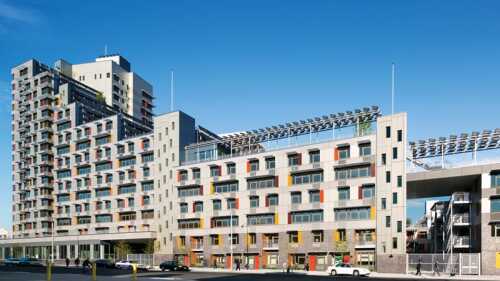At the opening session of the 2018 ULI Spring Meeting in Detroit, two developers who have been major forces behind the city’s recent resurgence said that the struggle to overcome decades of urban decay and other woes has positioned Detroit for robust growth.
“It’s crazy to look out the window and see cranes,” said Dan Gilbert, a Detroit native whose real estate firm, Bedrock, has amassed a portfolio of more than 90 properties in the city’s urban core amounting to 15 million square feet (1.4 million sq m). In December, Gilbert broke ground on a $900 million mixed-use project on the site of the former J.L. Hudson Company department store, which will include a 58-story, 800-foot-tall (244 m) skyscraper that will be Detroit’s tallest building.
“There’s a DNA here of not giving up, of continuing to believe that tomorrow will be a better day,” Gilbert said.
The fellow Detroit native who joined Gilbert on stage was similarly enthusiastic about their hometown’s prospects.
“I believe Detroit is at a special moment in time, ripe with opportunity and promise,” said Chris Ilitch, whose real estate firm, Olympia Development of Michigan, is involved in developing The District Detroit, a $1 billion–plus sports-and-entertainment destination that includes Little Caesars Arena, a professional sports and entertainment venue, and Comerica Park, home of the Detroit Tigers, as well as eight theaters, retail, restaurant and office space, and five mixed-use neighborhoods.
Ilitch said that after decades of job losses in automotive manufacturing that did major damage to the city’s economy, Detroit has emerged “strong and increasingly diversified,” and ready to be at the center of technological innovation, such as the continued development of autonomous vehicles. Real estate services and management services firm JLL reported in 2017 that the central business district’s buildings had just a 7.5 percent vacancy rate.
Though Detroit’s population has declined steeply over the last six decades, from almost 1.9 million in 1950 to about 673,000 in 2017, that trend has begun to reverse, and both men said that the city is now able to retain talented college graduates who in the past might have gone elsewhere.
“We’re now a net positive in terms of college graduates,” Gilbert said. He described the city as having “a diverse population with talent in many fields.”
Gilbert said the city is increasingly attractive to employers in search of a location that will attract millennials eager to live in urban cores. “If you’ve got a good company, an exciting company, and the city is known as a great place, a cool place, an up-and-coming place, that to me is the formula,” he said.
Both men said that the ability of Detroit to emerge successfully from its 2013 bankruptcy—the largest by a municipality in U.S. history—was made possible by teamwork and cooperation among city and state government elected officials.
“The mayor, the city council, and the state legislature worked together to get the city out of bankruptcy,” Ilitch said.
As a sign of that success, the city government recently was released from state financial oversight after posting three straight balanced budgets, according to the Detroit Free Press.
Gilbert said the city had come a long way since the mid-1970s, when he would drive around with his grandfather, who would point out closed businesses and vanished buildings. “He kept saying, ‘Usta,’” Gilbert recalled. He noted that for decades, that word—referring to notable buildings that used to exist—was used in Detroit all too often.
But things have changed. Gilbert said that he now favors the word “gonna,” as in, “there’s gonna be a building over there.”
Ilitch made the same point, using an automotive metaphor. “The engine of development in Detroit is just getting started,” he said.
Both Gilbert and Ilitch are at the helm of sprawling business empires. Gilbert is founder and chairman of Quicken Loans, which has overtaken Wells Fargo to become the nation’s largest mortgage lender, and of Rock Ventures, whose portfolio includes more than 100 businesses. Ilitch is chief executive of Ilitch Holdings, whose ventures range from Little Caesars Pizza to baseball’s Detroit Tigers and hockey’s Detroit Red Wings.
Robert S. Taubman, chairman, president, and chief executive officer of Taubman Centers, a Bloomfield Hills, Michigan–based company that owns, manages, and leases shopping centers in the United States and Asia, served as the moderator. He described Detroit as “one of the most remarkable urban revival stories in our nation’s history.”






